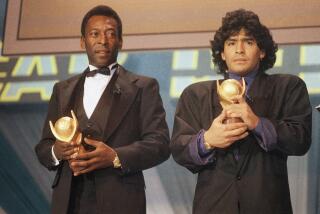WORLD CUP USA ’94 / ROUND OF 16 : THE Goal-Dust Twins : With Romario and Bebeto at Forward, Brazil Poses a Big Problem, but as Many Will Attest, It’s Not Always for the Other Team
- Share via
LOS GATOS, Calif. — The forward is poised in front of a Brazilian flag, set to strike a ball that appears as if it will explode through the page of the magazine. The words with the advertisement read: “The mood of a country usually swings with the economy. The mood of Brazil swings with Bebeto’s right foot.”
But before you rush out in pursuit of the advertiser’s product, consider this scene:
In the path leading from the field to the dressing rooms at Stanford Stadium, a stage has been constructed from which players and coaches can deliver words of wisdom to the world’s soccer media.
That is what Bebeto is doing, articulately explaining the finer points of Brazil’s 2-0 victory over Russia in the World Cup’s first round, when his partner at forward, Romario, saunters past. Suddenly, Bebeto is alone as dozens of Brazilian reporters turn and follow Romario up the stairs and to the door of the team bus, where he finally bestows on them two sentences before disappearing inside.
Is there any question about who is the man among the boys from Brazil? As Brazilians say, each team needs a singing rooster, and on the team that will meet the United States at Stanford Stadium in the second round Monday, it is Romario de Souza Faria
who sings.
In interviews, which have been few and far between at the team’s heavily secured Villa Felice headquarters here, he has admitted that he is an egotist and selfish. But as the player most relied on by his teammates to score, he says--almost apologetically--he must assume those characteristics to be effective.
If it is a role, it is one he relishes. He seeks attention with the same intensity he seeks a seam in the defense--getting married in 1988 to his 17-year-old girlfriend while standing on a local stadium’s penalty spot in a ceremony that was televised live, calling living legend Pele senile and “a museum piece” and convening a news conference to announce his refusal to sit in his assigned seat next to Bebeto on the team plane. Besides, he said, he wanted a window seat.
Although Romario often offers unsolicited advice to his coaches about who should and should not be playing, he acknowledges that Bebeto belongs alongside him in Brazil’s lineup. That does not mean Romario has to like him.
They are unrelenting rivals in Spain’s first division, where Romario, 28, plays for traditional power FC Barcelona, and Bebeto, 30, for upstart Deportivo de La Coruna.
But the rivalry began more than a decade ago, when they were correctly identified as two of Brazil’s rising stars, and, according to team officials, stemmed from a personality clash.
For evidence of that, look no further than their lifestyles in Spain. Bebeto is a devoted family man who brought his housekeeper from Brazil to Spain so that the lives of his wife and children would not be so greatly disrupted when he moved there to play. Romario also is married and has two children, but he and his best friend, Barcelona teammate Hristo Stoichkov of Bulgaria, are vigorous participants in the city’s midnight-to-dawn nightclub scene.
Even in recent kidnap incidents in Brazil involving the families of both players, Romario’s was more dramatic.
Reputed mobsters tried to kidnap Bebeto’s wife and brother, but five others actually did abduct Romario’s 62-year-old father, Edevair Souza de Faria. Demanding $7-million ransom, they held him for six days before they were caught by police. Not only did they not harm him, they provided him with a mattress, cold beer and a television so he could watch his son play a game in Spain.
But although it is convenient for the media to paint contrasting pictures of the two strikers, they are not so different as it appears on the surface. Romario flaunts his impoverished childhood, speaking often of the Rio de Janeiro favela --shantytown--where he grew up and the coins he earned by washing car windshields at stop lights. Jose (Bebeto) Roberto Gama de Oliveira does not talk as much about it, but he also grew up poor in the provincial city of Salvador de Bahia.
Both also are secure enough in their talents to speak out against their coaches. After leading Brazil to the silver medal in the 1988 Summer Olympics, they protested bitterly when Coach Sebastiao Lazaroni used them for a combined total of only 72 minutes during the 1990 World Cup.
Bebeto was so put off by Lazaroni’s successor as the national coach, Paulo Roberto Falcao, that he quit until a new coach, Carlos Alberto Parreira, was hired. The injured party then was Romario, whose complaints when left out of the lineup for an exhibition game against Germany were so divisive that Parreira suspended him for nine months. Brought back to the team for the final World Cup qualifying game against Uruguay, Romario scored both goals in a 2-0 victory.
The ability to score is something else Bebeto and Romario have in common. After Bebeto led Spain’s first division in 1992-93 with 29 goals, Romario led last season with 30. In the first round of this World Cup, Romario had three of Brazil’s six goals and precipitated another when he was fouled in the penalty area. Bebeto has one goal and one assist, but at least one opponent thinks he is a more valuable player than Romario.
“Bebeto can do more,” Cameroon defender Samuel Ekeme Ndiba said after a 3-0 loss to Brazil. “He can create things with his dribbling and crossing passes. He’s more athletic. He is more than just a goal getter.”
Bebeto, 5 feet 10 and 145 pounds, is quick, agile and so adept with the ball that Pele has suggested he should be the play-making midfielder. If he has a weakness, it is that defenders can knock him off the ball--if they can catch him. When they do, he often whines to the referee. Romario stuck him with the nickname “ Chorao “--Crybaby.
Romario, in contrast, stands only 5-6, but he weighs 154 pounds and cannot be pushed around. His weakness is that he seldom will go searching for the ball, but when it comes to him he can be devastating.
“I stand there,” he says, “pretending I am dead.”
Parreira calls him “the king of the penalty area.”
Hardly contrite after his suspension, Romario still advises Parreira on the lineup. When Pele recently said that Romario should let the coach coach, Romario responded by calling Pele “mentally retarded.”
But Parreira has learned to let Romario be Romario. The forward, who says that practicing is a waste of calories, was excused from the team’s final training camp before leaving for the United States because he wanted to play volleyball on the beach with friends.
Asked recently if Romario is a problem, Parreira said, “Yes, he’s a big problem--for the other team.”
Romario has tried hard to become a team player for the World Cup.
“I know I am a difficult guy,” he says. “It’s because I’m authentic. I say what I think to your face. But the other players like me because they know that if Romario does well, the team will get results. I’ve been telling everybody that I’m ready to give my blood for this Cup.”
So far, he has fit in well with his teammates, playing drums for their improvisational samba band. As long as he continues scoring, it does not matter if he marches to a different conga.
Times staff writer Mike Penner contributed to this story.
More to Read
Go beyond the scoreboard
Get the latest on L.A.'s teams in the daily Sports Report newsletter.
You may occasionally receive promotional content from the Los Angeles Times.







